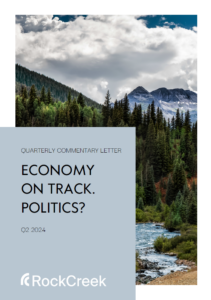Markets were calm in Q2. The political scene was not.
Helped by lower inflation and evidence of a gentle cooling in the labor market, volatility in US financial markets stayed low throughout the quarter. Markets were buoyant as evidence mounted that the hoped-for soft landing is within reach. The US economy continued to outperform, with the latest GDP figures showing growth above potential in the US while Europe stayed in the doldrums and China’s growth prospects dimmed during Q2.
Looking ahead, RockCreek sees three themes for investors to watch in the coming months:
Politics. In an era of disruptive and volatile global politics, the most important election is coming in November, in the US. Recent political and geopolitical upheavals may have had only a short-lived impact on markets. It is hard to price in long-term changes that may come from uncertain macro events. But big shifts in sentiment and policy, for example, the UK vote for Brexit, eventually affect economic outcomes, even if it takes time for the impacts to be felt.
Monetary easing: Fed to follow now? In a break with the usual pattern, the Federal Reserve has been lagging the global monetary cycle this year rather than leading. After counterparts in Europe and Canada took the first steps to ease in Q2, the Fed is likely to cut rates in Q3 and again in its November meeting. Will this come soon enough to stick the soft landing?
Globalization under pressure. The pandemic is over. Supply bottlenecks have unwound. But the move to highlight resilience rather than efficiency is still top of mind for policymakers. Industrial policy with subsidies and protected markets is being advanced in the US and other key economies. That opens opportunities in areas deemed to be high national priority, including the energy transition, advanced technology and manufacturing. But the open markets that America has championed in the past have supported US innovation and growth. American business has generally thrived on global competition. This competition has hurt some workers and communities, who have not been served well by inadequate policies to compensate. But ordinary Americans have also seen their living standards climb by more this century than those in other advanced economies. A move away from integration in the global economy is likely to disappoint those hoping for more growth and better jobs.
